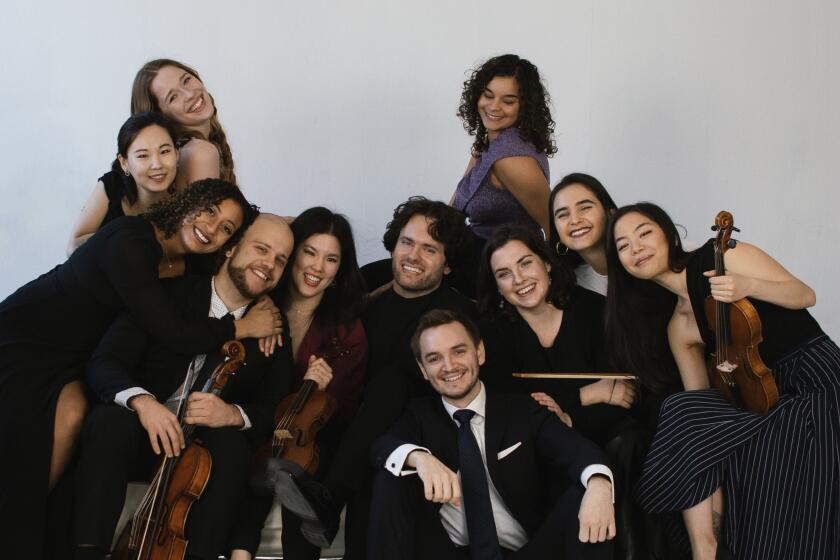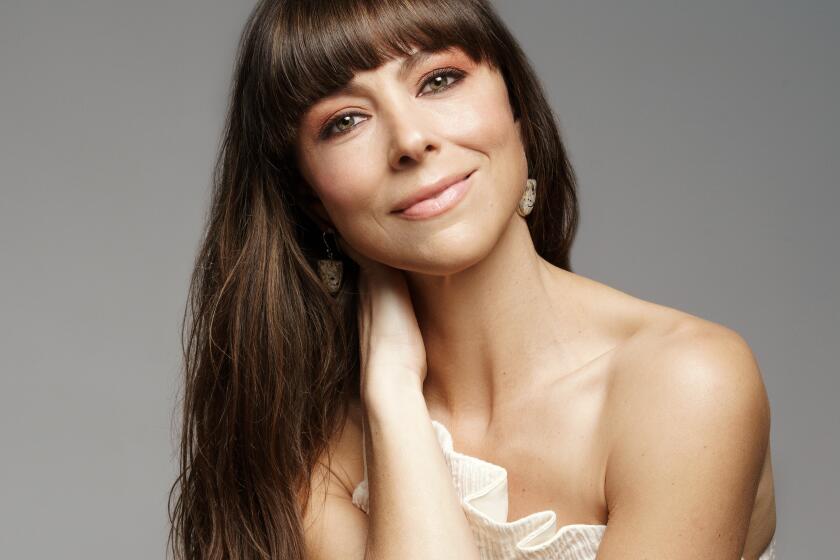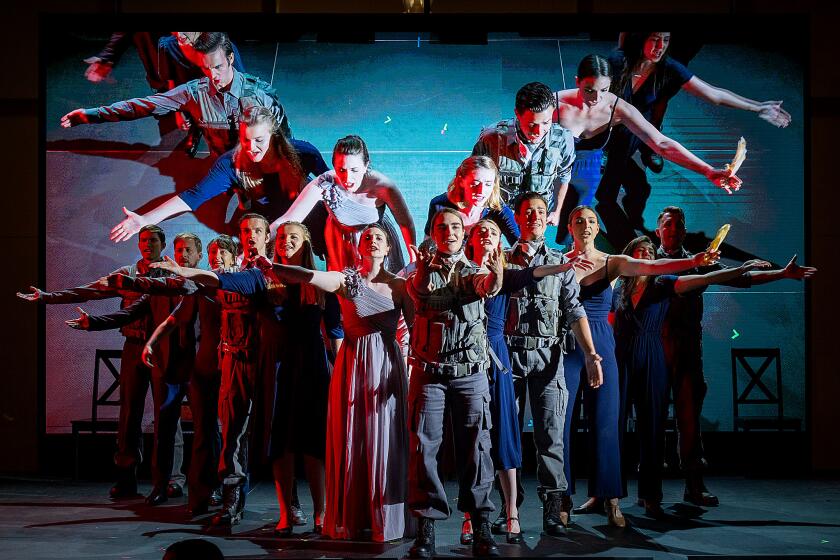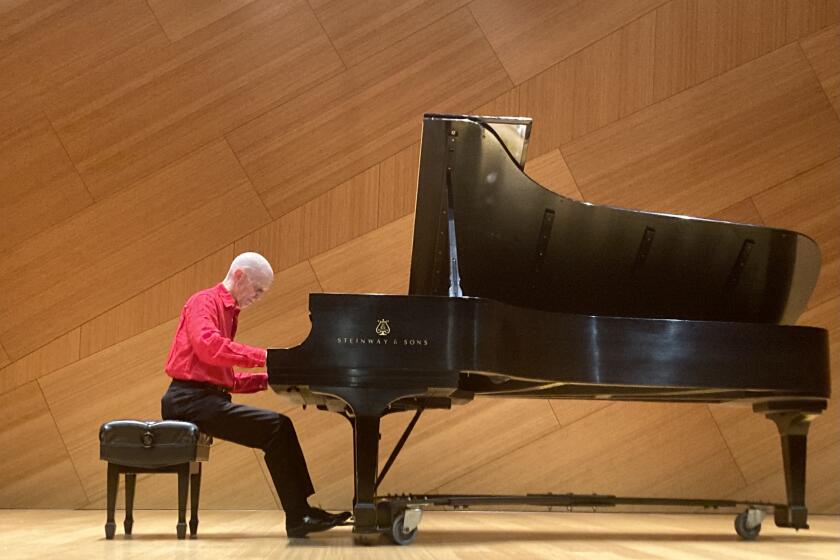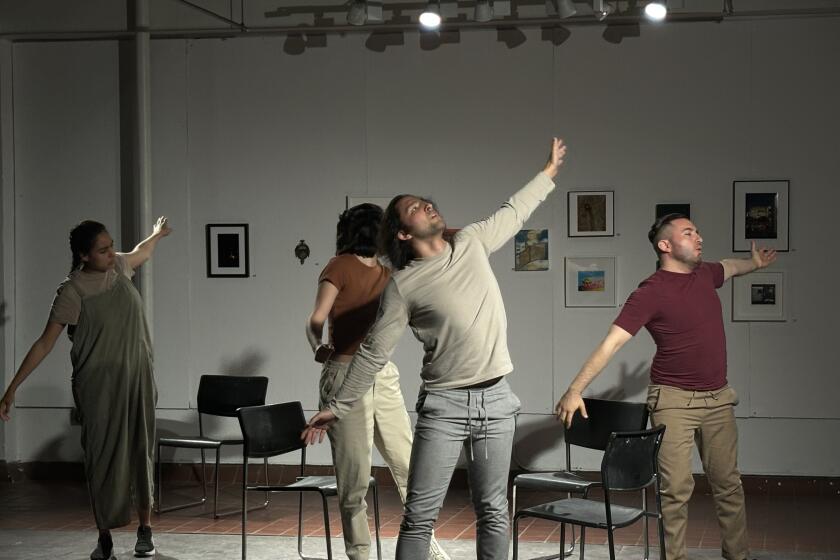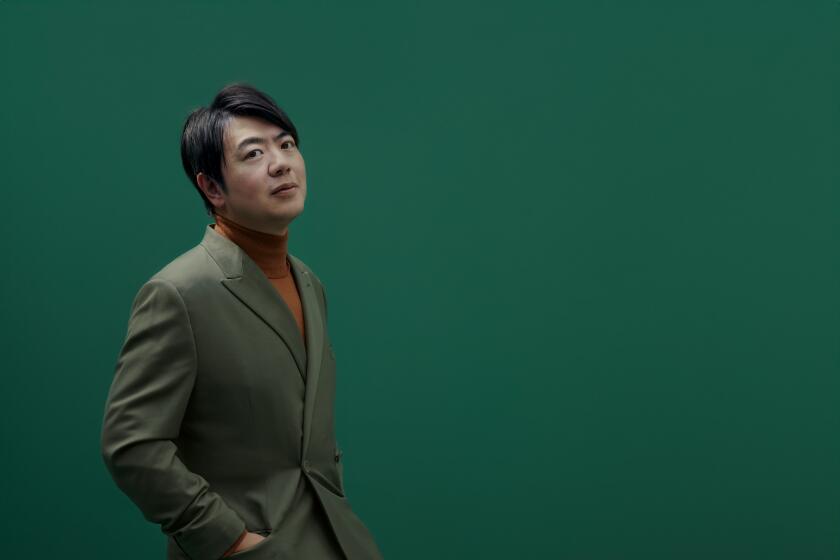Mirga Gražinytė-Tyla on the art of collaboration
Mirga Gražinytė-Tyla had just arrived in Los Angeles, where she is associate conductor of the Los Angeles Philharmonic, but she couldn’t leave Europe behind.
“This morning, I was Skyping, both with my family members and with my partners at work, and in every conversation the subject is France and what is going on,” she said last week. “There is a lot of panic.”
It seems as if there’s no escape from the refugee crisis and its consequences. Only a few days earlier, she had conducted “Carmen” at the Salzburger Landestheater, where she is music director, and even something routine like traveling from her home in Heidelberg, Germany, to Salzburg, Austria, has become a task.
“It used to be very simple. You could do it anytime,” said Gražinytė-Tyla, who turns 30 next year. “But in September and October, when I had to make the journey, I had to take a bike because there were no trains between the two countries.”
She’d take the train to the city closest to the border, then bike across the border and catch the train at the next station. “And any time you came to the station, you saw all these refugees lying on the floor,” she said. “It’s a big question, what we should do, and everyone is asking: What is going to happen?”
She can’t speak for everybody, but Grazinyte-Tyla knows what she’s going to do. She’s going to make music. On Dec. 4-6, she guest-conducts the San Diego Symphony at Jacobs Music Center, and Dec. 10-12, she conducts the Los Angeles Philharmonic at Disney Hall.
“I think our responsibility is really sharing music, communicating with each other in our close circle, but also in the big circle, as far as it can reach,” she said. “And sharing the best thing we can is definitely our main task at the moment where so many things, so many tragic things, are happening.
“We have to somehow balance, even if just a little bit, the energies of the globe, sharing the positive ones. And through music, we have a lot of possibilities to do it.”
Collaborative outlook
In a recent interview in a practice room at Disney Hall, Gražinytė-Tyla repeatedly came back to that word: share.
The winner of the Nestlé and Salzburg Festival Young Conductors Award, and a guest conductor of the Mahler Chamber Orchestra, the Vienna Chamber Orchestra, the MDR Leipzig Radio Symphony Orchestra and the National Symphony Orchestra in her native Lithuania, she’s making a strong impression in Europe and earned stellar notices in her debut with the Los Angeles Philharmonic at Disney Hall (her first time conducting a U.S. orchestra) and her subsequent debut conducting the Philharmonic at the Hollywood Bowl.
Her approach is based on collaboration, or you could say, sharing. She shares with the musicians, together they share with the audience and beyond in the “big circle.” And it starts in that first rehearsal.
“It’s about a journey with a piece, and with the people, together,” said Gražinytė-Tyla, who speaks at least four languages and is still perfecting her English. “We are doing the piece together. I think all of us bring our inspiration to the first rehearsal. Until that first rehearsal, I’m in a search for what is the best way to serve the composer, but then I want to want to share with the musicians, and I also want to receive what they were searching in their lives for many years and what they bring.
“I think we all wish to share the music and this inspiration. That’s why I couldn’t really think about commanding something, or following the military model of leading. It can have its advantages also, but I feel much more familiar, or, close to the other way where it’s a partnership.”
She traces her collaborative outlook back to her childhood, when she sang in her father’s choir. Although Romualdas Grazinis was her first conducting teacher and a significant influence on her life, she also discerned from him what not to do.
“He was and still is a very important person for me,” she said. “I learned a lot from him. At the same time, although I really appreciate the way he leads as a conductor, he commands often and he has to beat the piano sometimes if the choir is not fast enough.
“I know the reasons because he has a very strong vision of a piece and he wants to achieve it. ... But still, having spent a lot time in rehearsals in his choirs, and singing in them as well, somehow on both conscious and unconscious levels, I really want to follow this other way, this partnership style.”
Both her father and her mother (who is a pianist and singer) tried to “protect” her from having a musical career. In Lithuania, in a system modeled on the old Soviet system, musically gifted children are sent to a special school at the age of 6. Gražinytė-Tyla was not; her parents first sent her to a school with an emphasis on French, and then sent her to study painting.
“During all those choir rehearsals, sitting there as a little girl, I was painting,” she said. “I was painting the choir, painting their pieces, and my parents went, well, maybe this could be it. In fact, it’s strange they wanted to save me from the hard musical life; as a painter it’s not necessarily easier. But after one year in this department for painters, I said, I want only music.”
Competitive opportunities
At that point, she was all of 11 years old, and one of the few musical programs she could still enter at the performing arts school in Vilnius was choral conducting. She later attended the University of Music and Performing Arts in Graz, where she also pursued instrumental conducting. Her talent was confirmed in several important conducting competitions, including the ones she won.
She doesn’t see the importance of a competition in who wins and loses. She had an influential professor in Graz who told her you win before you compete. It’s in the preparation — learning the repertoire and setting a higher standard for yourself — that you benefit from a competition.
“What happens then (with the actual competition) is it is just a lottery in many ways,” she said. “And it’s great if you are lucky there. If you are lucky it has advantages and disadvantages. And if you are not lucky, it also has advantages and disadvantages. You learn from it, you become stronger. And you just continue to stay (focused) on the main point, which is not the competition, it is the process.”
Success engenders success, and the exposure she gained in competitions resulted in guest-conducting opportunities, which resulted in her appointment as a Gustavo Dudamel Fellow of the Los Angeles Philharmonic in 2012-13 and enabled her to visit the United States. The way she handled herself during that fellowship resulted in the Philharmonic appointing her assistant conductor, and then recently upgrading her status to associate conductor.
It’s hardly a secret that the San Diego Symphony’s music director, Jahja Ling, leaves in 2017 and the orchestra is looking for his successor. Is Gražinytė-Tyla interested? Does she feel any additional pressure in her debut this weekend with the ensemble?
“I’m very much looking forward to meeting the orchestra and doing this wonderful program (Beethoven’s “Leonore” Overture, Sibelius’ Violin Concerto with soloist Karen Gomyo, and Stravinsky’s “Rite of Spring”).
“But it’s a little bit like the question about what’s going to happen and where are we going? We can have our thoughts about it, but it is not only in our hands.
“We can just try to do our best right in the moment.”
jim.chute@sduniontribune.com ▪ Twitter: @sdutchute ▪ facebook.com/utartmusic
Get U-T Arts & Culture on Thursdays
A San Diego insider’s look at what talented artists are bringing to the stage, screen, galleries and more.
You may occasionally receive promotional content from the San Diego Union-Tribune.

